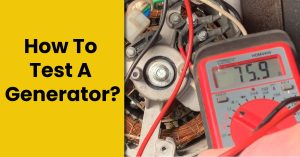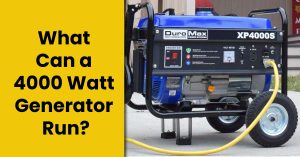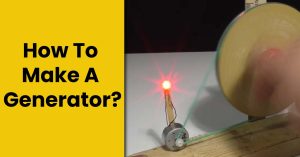Why Is My Generator Backfiring? [Tips To Fix It]
In this article, we have answered the question “Why is my Generator Backfiring?”, causes, and solutions. We have also covered afterfire and its causes.
The loud popping sound when you start the generator is backfiring. This sound is like a balloon bursting or a shotgun firing. Depending on the generator, smoke or flames may also shoot from the exhaust when the generator backfires.
But, loud pops, smoke, and flames don’t always mean backfiring, it could also be a generator afterfire. There is a between the two and people often confuse afterfire with backfire.
What Is The Difference Between Generator Backfire And Afterfire?
When hearing loud pops and seeing flames or smoke from the carburetor, it is “backfiring”.
When the generator exhaust makes a popping noise or you see flames or smoke, it is “After firing”.
Why Is my Generator Backfiring?
There could be several reasons behind backfiring like incorrect air-fuel mixture ratio, early combustion, and problems with the intake valve.
Since backfiring is related to the carburetor, let us see the common causes.
Causes Of Generator Backfire
1. Limited Air-Fuel Mixture In The Carburetor
For proper combustion, the right amount of air and fuel is important. If the air supply is insufficient, the combustion will be incomplete (will release more CO in the atmosphere) and slow.
Due to slow combustion, the power stroke of the piston will come to an end while the combustion process is still in progress. Therefore, when the piston goes up in the exhaust stroke, it will be interfering with the combustion process.
So the reason you see flames is at the end of the power stroke, everything should have already been combusted, but the combustion process (slow) is still in progress as the piston moves for the exhaust stroke. As a result, the exhaust stroke expels the burnt combustion.
The generator is likely to consume more fuel. There are other reasons as well why a generator consumes more fuel. Check that out too.
Why My Generator Is Popping?
When the intake valve opens, the new batch of the air-fuel mixture is sucked in like a vacuum, but the combustion process is slow and is still in progress due to an incorrect amount of air-fuel supply, the flames can instantly ignite with the new batch of air-fuel and travel back up to the carburetor. The result will be a loud pop, flames, or smoke.
2. Premature/Early Combustion
Normally, when enough fuel-air mixture enters the combustion chamber, the piston starts rising, and the intake valve shuts down.
But, in some cases intake valve fails to close on time. In this situation, there will be combustion of the air-fuel mixture on the combustion plug. The hot burning air and fuel will also move to the carburetor by the piston and as a result, the generator backfires.
A faulty ignition coil, damaged spark plug, or damaged flywheel key can cause this fault in timing.
3. Faulty Intake Valve
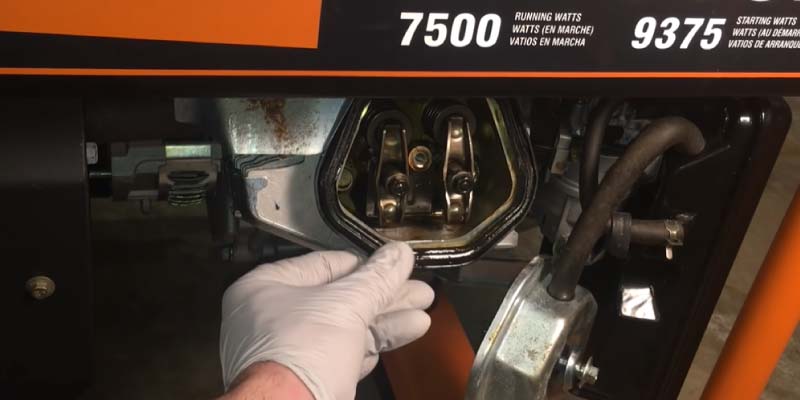
The intake valve opens and closes to allow the fresh batch of the air-fuel mixture into the combustion chamber.
A faulty intake valve will not close or open on time which can trigger improper combustion. As a result, the generator backfired.
There could be several reasons for a faulty intake valve like the rocker arm area not being right, the clearance area between the pushrod and valve stem being wrong, and the decompressed spring.
To diagnose this problem, you will have to remove the valve cover to check the rocker arm area. See if the springs are compressed and nothing is damaged.
I repair faulty intake valves myself as I am an experienced professional, you can involve a mechanic because it can get tricky.
4. Low Oil
The generator will backfire if it is on low oil. The first thing you want to do is to check the oil using a dipstick whenever your generator backfires. Keep that in mind. you can follow this guide to change the generator oil safely
5. Low Or Old Fuel
Old and dirt fuel tends to become less flammable compared to fresh fuel. It is less combustible. If the gasoline isn’t burning as it should, it will negatively impact the combustion performance.
Check the fuel level while you are at it, maybe the tank is low on fuel. Generators tend to backfire when they are low on fuel.
6. Choked Lever
The choke valve stops the air intake before starting the engine. This is a less likely reason for backfiring because everyone knows that an open choke leads to generator backfiring. However, check it out, maybe your choke lever is halfway or fully opened.
7. Fuel Valve
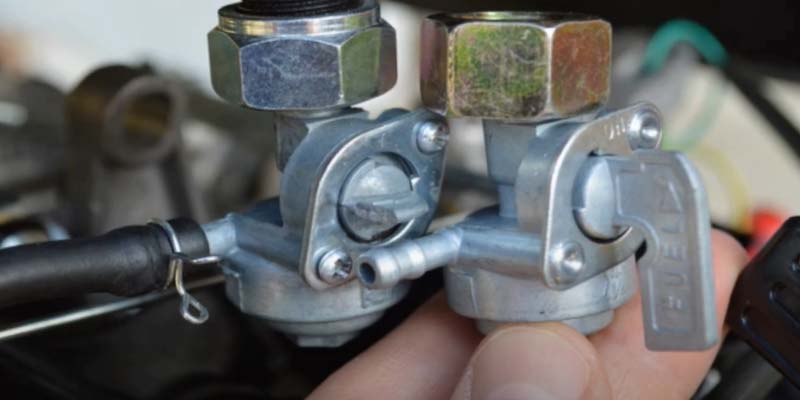
The transfer of gasoline from the tank to the combustion chamber is controlled by the fuel valve. A partially closed fuel valve limits the fuel intake which leads to backfiring due to incomplete combustion.
A proper ratio of fuel-air mixture is necessary for proper combustion. Check if the fuel valve is completely opened or not. Check the fuel filter as well, over time it could become clogged.
8. Clogged Carburetor
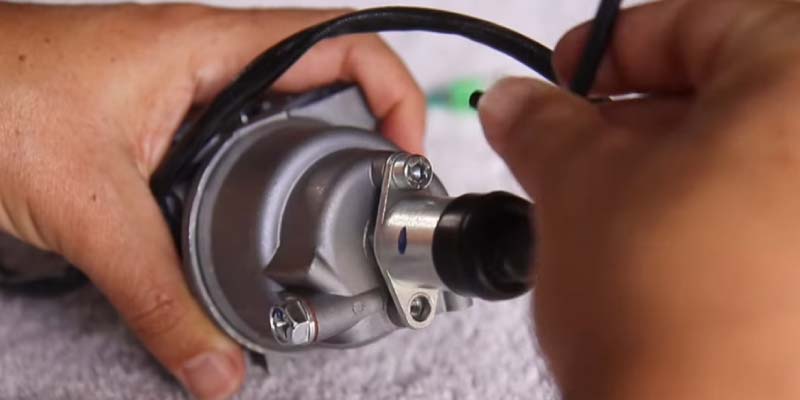
I don’t use the generator for some time, the old fuel can clog the carburetor. The debrief in it stops the fresh fuel to get in properly which leads to incomplete combustion due to improper air-fuel mixture in the combustion chamber.
Remember to drain your drain carburetor before storing away the generator to avoid clogging. We have written a detailed guide on how to drain your carburetor.
9. Issues With The Spark Plug
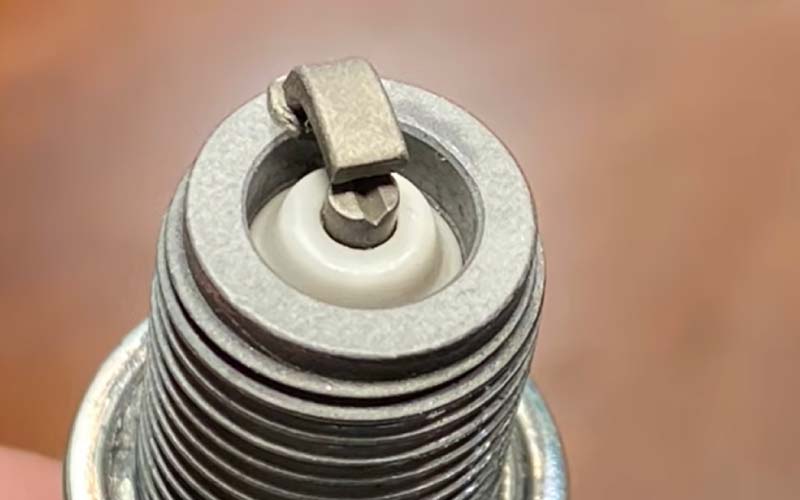
I always have this issue of bad spark plugs in my motorbike, and generators. A dysfunctional spark plug can cause backfiring and your generator may fail to start.
To fix this issue, either remove the carbon deposits over the spark plug or replace it.
Even propane generators backfire. Check out this post to learn more about it.
Why Did My Generator Backfire When I Shut It Off?
When your generator is running RPM and you shut it off directly, it will likely cause a backfire. The reason is the residual motion of the piston.
This residual motion of the piston or momentum will cause spontaneous combustion of the mixture in the combustion chamber. That is why you hear a popping sound after shutting off the generator.
You can prevent this issue by bringing the generator to idle mode for a couple of minutes before shutting it down. Disconnect all the load before doing so.
How To Fix Generator Backfiring
First of all, you would need to identify the reason for backfiring. It would likely be one of the above-mentioned issues. You would also need to check if your generator backfires when dropping from higher RPM to lower RPM when switched off, because it may not need repairing.
However, if a generator backfires during startup or running, it may need repairs.
The following methods will help you to fix your generator backfiring:
Carburetor And spark plug:
- If the problem is consistent, your air-fuel mixture ratio is incorrect. In that case, you would need to clean up your carburetor. A faulty spark plug can also cause this.
- 80% of the generator backfiring issues are resolved after a proper cleanup. You would need to drain your carburetor if you are planning to not use your generator for some time to avoid the issue in the first place.
Valve:
- If the backfire occurs during the startup, I would focus on the valve.
- It could be a decompressed spring, incorrect clearance between the valve stem and pushrods, or a bent rocker arm.
- There is a bunch of issues that could arise from the valve face in the combustion chamber.
Backfire During Switching OFF:
- When switching off the generator, you could experience a backfire.
- In such a case, unplug all the load and run the generator on ECO-MODE/idle mode for a couple of minutes.
- Normal combustion will limit the probability of backfire.
Can A Generator Backfire Damage The Engine?
A backfire where the popping sound and the exhaust are pushed through the carburetor is a bit troublesome for the engine.
It is troublesome because we got gasoline stored in the carburetor ready for combustion.
If you continue running the generator even after severe backfiring, the engine might get damaged. It could also lead to a fire.
What Causes Generator To Afterfire?
Generator after fire means loud pops, smoke, and flame coming out of the generator exhaust. The following are the causes of the generator after fire:
1. Problem With The Air-Fuel Mix
Like backfire, afterfire can also happen due to a lean running engine (improper combustion). An incorrect/lean air-fuel mixture burns incompletely and slowly. Carbon monoxide concentration will be higher and you will see pops and smoke from the exhaust.
2. Problems With A Rich Air-Fuel Mix
A rich mixture of air-fuel mixture where a higher ratio of fuel to the air can also cause afterfire. When the mixture enters the combustion chamber, the lack of oxygen will not allow proper combustion.
A portion of fuel remains unburnt, and that unburnt fuel is pushed out during the exhaust stroke. That unburnt fuel mixes with the atmosphere air and spontaneous combustion occurs. Hence, the loud pops and flames came out of the exhaust.
3. Delayed Combustion
As we have already discussed that delayed combustion can cause a backfire, and it can also cause an afterfire in the exhaust.
During the piston’s compression phase, the spark plug delays the ignition spark. The air-fuel mixture combusts late.
Now the mixture will combust in the exhaust step, as the piston moves downwards. When the mixture reaches the exhaust, it spontaneously combusts with the help of atmospheric oxygen. Hence the popping sounds.
3. Problem With The Exhaust Valve
Over time, carbon forms a layer on the seat of the exhaust valve that prevents the valve from completely sealing the area.
Without the proper seal, the unburnt mixture will pass into the exhaust chamber. The mixture will rapidly ignite causing loud popping sounds.

Alex Black is a seasoned electrical engineer with a remarkable 8-year track record specializing in appliances, generators, and transfer switches. With extensive hands-on experience in the field, Alex possesses a deep understanding of electrical systems and their intricate workings. Throughout their career, Alex has consistently demonstrated expertise in designing, troubleshooting, and maintaining various electrical appliances.




